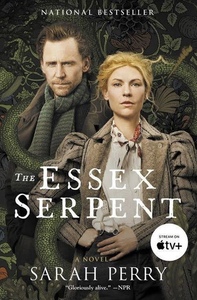You need to sign in or sign up before continuing.
Take a photo of a barcode or cover
As one might expect from a novel that blends science and a dose literary feminism (to be described in just a moment), Perry's novel shines most brightly in describing scenes of nature. In particular, I found myself drawn to her descriptions of fog and its promise of thrills and mystery, or at least mystification.
Having obtained this book from a book swap party, I was excited by the promise of mystery, a nineteenth century British milieu, and a more progressive conception of what it means to be a "woman" when one's inclinations are societally marked as masculine. Truthfully, I didn't think the novel delivered completely on any of those promises (that I believe were made, though perhaps not acknowledged by the author). Throughout the story, the serpent adequately serves as a metaphor for fear, self-alienation, and change; the serpent is not the same serpent for everyone, mind you, which Perry communicates adeptly - making it probably the most successful aspect of the novel for me (unexpectedly so, even, given the title of the novel).
The "literary feminism" I had heard buzzed about this novel didn't feel super clear. Cora is certainly an interesting character, in part because of her willingness to disregard society's expectations to a point but also because her connection to the earth and science is relatable and contagious. I understand the point of linking her to a man of privilege, her being a widow of a powerful and wealthy individual. I didn't see or necessarily understand the need to tie her to men in such stifling ways throughout the story. Her most powerful allies are women (Stella and Martha for markedly different reasons), though the connection between them feels under explored. And, I guess that means the end wasn't enough for me.
I really struggled with the relationship between Cora and Will. The obviousness of their tension and connection (representing empiricism/science and spirituality, respectively) was hard to stomach. Though the novel makes it clear that neither has an authoritative control of the story, their interconnection just seemed...obvious? unexciting? too superficial? I don't know how it lands with me on the whole, but their scene of "connection" just really put me off.
Ultimately this novel is poignant when its points are more nuanced, more blurry. Some of Perry's more obvious attempts at symbolism didn't work and made some of her more interesting investigations difficult to find and interpret.
Having obtained this book from a book swap party, I was excited by the promise of mystery, a nineteenth century British milieu, and a more progressive conception of what it means to be a "woman" when one's inclinations are societally marked as masculine. Truthfully, I didn't think the novel delivered completely on any of those promises (that I believe were made, though perhaps not acknowledged by the author). Throughout the story, the serpent adequately serves as a metaphor for fear, self-alienation, and change; the serpent is not the same serpent for everyone, mind you, which Perry communicates adeptly - making it probably the most successful aspect of the novel for me (unexpectedly so, even, given the title of the novel).
The "literary feminism" I had heard buzzed about this novel didn't feel super clear. Cora is certainly an interesting character, in part because of her willingness to disregard society's expectations to a point but also because her connection to the earth and science is relatable and contagious. I understand the point of linking her to a man of privilege, her being a widow of a powerful and wealthy individual. I didn't see or necessarily understand the need to tie her to men in such stifling ways throughout the story. Her most powerful allies are women (Stella and Martha for markedly different reasons), though the connection between them feels under explored. And, I guess that means the end wasn't enough for me.
I really struggled with the relationship between Cora and Will. The obviousness of their tension and connection (representing empiricism/science and spirituality, respectively) was hard to stomach. Though the novel makes it clear that neither has an authoritative control of the story, their interconnection just seemed...obvious? unexciting? too superficial? I don't know how it lands with me on the whole, but their scene of "connection" just really put me off.
Ultimately this novel is poignant when its points are more nuanced, more blurry. Some of Perry's more obvious attempts at symbolism didn't work and made some of her more interesting investigations difficult to find and interpret.
Ngl, really kinda disliked this. I enjoyed the first half of it and then it rapidly went down hill for me. I was intrigued by the odd character dynamics between many of the characters and the refreshing, unconventional, and uninhibited way they treated each other. However, it descended into a chaotic, unfocused mess, full of character drama and serpent-related fear and superstition that never gets a proper conclusion. I think the main sentiment I'm left with after finishing it was, what was the point of this book?
It makes sense that the summary gives a focused overlook, but the reality of the book doesn't really flesh out the ideas or plot progression introduced into it. There wasnt really any investigation of the Essex Serpent, which was more of a inconsequential backdrop to the messy, messy character stuff happening in it. I end up extremely disliking a majority of the characters presented which isn't great. The ending was fine, better than I expected which brought the rating up a bit.
dark
mysterious
slow-paced
Plot or Character Driven:
A mix
Strong character development:
No
Loveable characters:
No
Diverse cast of characters:
No
Flaws of characters a main focus:
Yes
dark
mysterious
tense
slow-paced
Plot or Character Driven:
Character
Strong character development:
Yes
Loveable characters:
Complicated
Diverse cast of characters:
No
Flaws of characters a main focus:
No
If you start this book with expectations that it will be about dragons or at least paleontology, you will be disappointed. Instead it's much more a book in the shape of Little Dorrit or Tess of the d'Urbervilles - a bit of an angsty exploration into the human condition. In particular this touches on belief in all the forms it takes: religion vs atheism, Christianity vs folklore and superstition, structure vs unstructure. But there's commentary on social class, poverty and housing, of disability, feminism and womanhood.
And the center of it all: Cora and William's relationship.
Initially willing to believe the worst of each other, they develop a deep friendship. (Which yes, does become hesitantly sexual.)
It's a bit queerplatonic honestly, and is summed up best by the bit about the word 'cleave' - both close to one another but also split apart. Cora and Will revel in each other, but are just as happy to write letters as to take rambling walks.
As to Stella's part, it's all a bit like A Promise with her giving her approval of their relationship.
Though I was promised a smidgen of homosexuality and honestly? With the relationship between Cora and her companion Martha, I would have liked a bit more closeness between Cora and Stella. (The two doctors are kind of Achillean, but it's a bit opaque and doesn't really happen until the last tenth of the book.)
What else? Oh, Francis is definitely autistic, though the setting means no one actually calls it that. They do at least let him be his self though, and don't try to fix him.
There's also the pre-pubescence of Johanna and her friend of playing at witchcraft and a dawning awareness they're becoming young women and not-yet-dashed hopes of (further) scientific education.
If the TV series in production follows the book faithfully, I do think some viewers will be disappointed - the ending is a little open and not nearly quite so romantic as might be desired. At the same time, it's very clear why Hiddleston was cast (and said yes): the description of William fits him to a T, there are some excellent monologues that are romantic, and while William is a central pillar of the story, the women who form the other pillars have a lot more to say and are much more interesting.
And the center of it all: Cora and William's relationship.
Initially willing to believe the worst of each other, they develop a deep friendship. (Which yes, does become hesitantly sexual.)
It's a bit queerplatonic honestly, and is summed up best by the bit about the word 'cleave' - both close to one another but also split apart. Cora and Will revel in each other, but are just as happy to write letters as to take rambling walks.
As to Stella's part, it's all a bit like A Promise with her giving her approval of their relationship.
Though I was promised a smidgen of homosexuality and honestly? With the relationship between Cora and her companion Martha, I would have liked a bit more closeness between Cora and Stella. (The two doctors are kind of Achillean, but it's a bit opaque and doesn't really happen until the last tenth of the book.)
What else? Oh, Francis is definitely autistic, though the setting means no one actually calls it that. They do at least let him be his self though, and don't try to fix him.
There's also the pre-pubescence of Johanna and her friend of playing at witchcraft and a dawning awareness they're becoming young women and not-yet-dashed hopes of (further) scientific education.
If the TV series in production follows the book faithfully, I do think some viewers will be disappointed - the ending is a little open and not nearly quite so romantic as might be desired. At the same time, it's very clear why Hiddleston was cast (and said yes): the description of William fits him to a T, there are some excellent monologues that are romantic, and while William is a central pillar of the story, the women who form the other pillars have a lot more to say and are much more interesting.
Had to return to library. Had a hard time getting into it. Might try again someday.
emotional
mysterious
medium-paced
Plot or Character Driven:
Character
Strong character development:
Complicated
Loveable characters:
No
Diverse cast of characters:
Complicated
Flaws of characters a main focus:
Yes
The book seemed to present itself as a Victorian narrative, but the characters all felt jarringly modern. The main character’s “not like the other girls” persona was one frustrating example. Stella and Francis were enjoyable point-of-view characters.
mysterious
slow-paced
Plot or Character Driven:
A mix
Strong character development:
No
Loveable characters:
No
Diverse cast of characters:
No
Flaws of characters a main focus:
Yes
emotional
mysterious
reflective
medium-paced
Plot or Character Driven:
Character
Strong character development:
Yes
Loveable characters:
Yes
Diverse cast of characters:
No
Flaws of characters a main focus:
Yes
emotional
reflective
medium-paced







